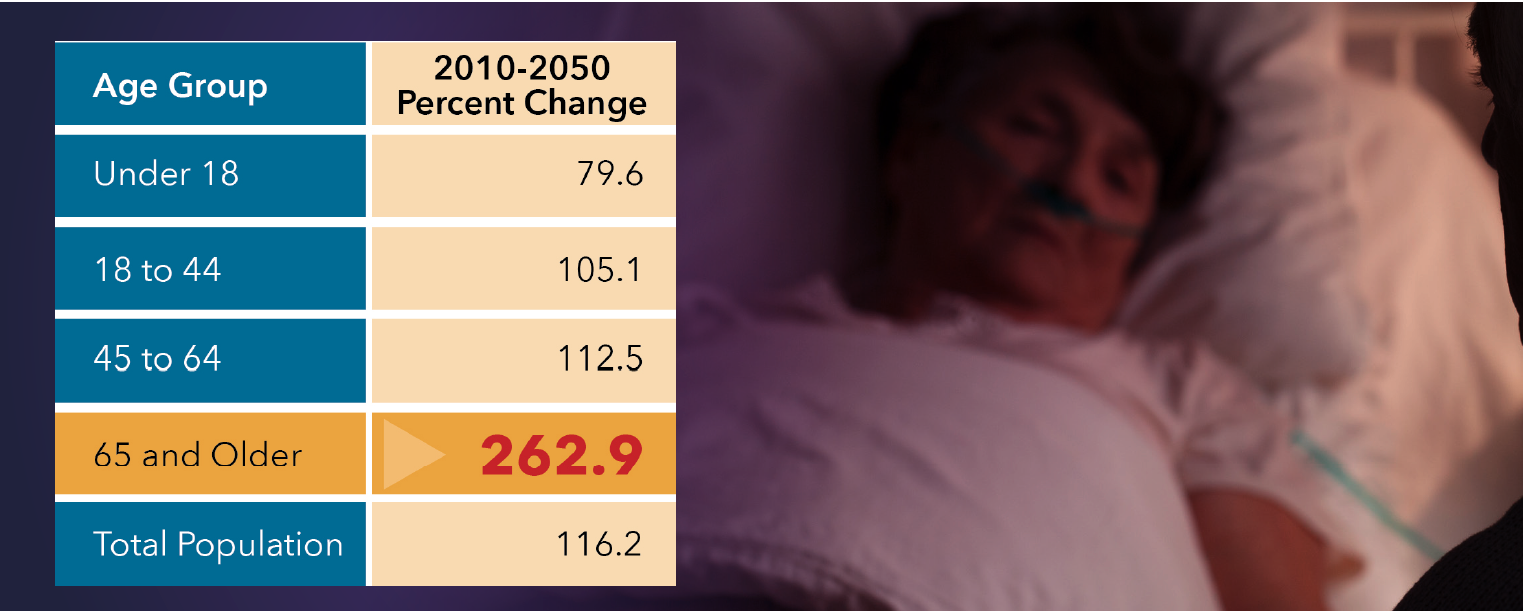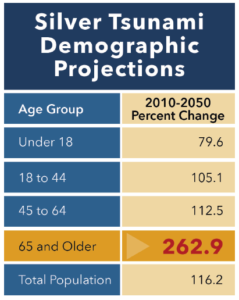
Texas Health Care Briefing No. 9
Sept 2018

Concern About Texas Nursing Homes’ Ability to Respond to Explosive Growth of Senior Texans
Demographics for Texas suggest that a “Silver Tsunami” will strain Texas nursing homes as Baby Boomers reach their 70s. Population projections from the Texas Demographic Center (2016) illustrate the approaching tsunami, with Texans 65 years and older growing at a faster rate than any other age group. That population is projected to surge from 2.6 million in 2010 to 5.9 million in 2030 and then to 9.4 million by 2050, a 262.9 percent increase. With many Texas nursing homes already reeling from chronic underfunding and annual workforce turnover rates that exceed 90 percent, industry experts are warning policy makers that the impending flood of individuals needing long term care could destabilize the state’s long term care industry.
 Both new and longtime staff are leaving the nursing home industry permanently because of better wage opportunities, demanding job responsibilities and a demanding regulatory environment. Staffing stability is one of the leading determinants for maintaining quality of care in a long term care facility. Having one of the lowest Medicaid reimbursement rates in the country impedes wage growth that would encourage frontline caregivers to remain caring for senior Texans. The state’s current Medicaid reimbursement rate falls approximately $10,000 short of covering the allowable costs of care per patient, per year.
Both new and longtime staff are leaving the nursing home industry permanently because of better wage opportunities, demanding job responsibilities and a demanding regulatory environment. Staffing stability is one of the leading determinants for maintaining quality of care in a long term care facility. Having one of the lowest Medicaid reimbursement rates in the country impedes wage growth that would encourage frontline caregivers to remain caring for senior Texans. The state’s current Medicaid reimbursement rate falls approximately $10,000 short of covering the allowable costs of care per patient, per year.
Long term care leaders believe addressing the workforce crisis is imperative to ensuring nursing homes have the ability to provide high-quality care to seniors with increasingly complex medical needs. Today’s nursing home population suffers from complicated neurological-related illnesses and dementia, such as Alzheimer’s and Parkinson’s diseases. The prevalence of these illnesses is expected to continue to increase, especially as the elderly population grows. The behavioral and psychiatric symptoms of Alzheimer’s and related dementias are among the most challenging for health care providers to manage. Nursing facility residents with cognitive impairment require round-the-clock, intensive support for daily living activities and patient-centered care needs. These residents benefit greatly from having consistent, dedicated staff anticipating the behaviors that can occur and improving the care being provided.

